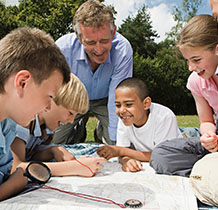Resource Database

Click on a topic or use the search box below to look for a listing:
There are 488 resources. Displaying 10 resources per page.
Families play an essential role in helping students navigate options for college and career after high school. This blog post from Edutopia describes how one district hosted a middle and high school information event that introduced families to their students’ post-graduation options. Students co-planned the event, and the district also worked closely with the community to provide resources and information.
View Resource
The Right Question Institute (RQI) is a nonprofit educational organization that provides strategies to build people’s skills to ask better questions, participate in decisions that affect them, advocate for themselves, and partner with service providers. Resources for educators include lesson planning guides, instructional videos, webinars and podcasts, and activities for different subject areas and grade bands. Free registration is required.
View Resource
Academic Enrichment
The 1619 Project, inaugurated with a special issue of The New York Times Magazine, challenges us to reframe U.S. history by marking the year when the first enslaved Africans forcibly arrived in Virginia as our nation’s foundational date. To support educators in using this resource, the Pulitzer Center has created reading guides, activities, and other resources that will assist with the implementation of The 1619 Project in schools and other places of learning.
View Resource
Academic Enrichment
A recent study found that arts integration in fifth-grade science classrooms led to students’ long-term retention of science concepts. The approach was at least as successful as conventional science teaching. It was particularly helpful for students with the lowest reading scores. The study findings are published in Trends in Neuroscience and Education, and public media station KQED has a story on how art can help center a student’s learning experience. For strategies on integrating the arts into your STEM (science, technology, engineering, and math) program, check out this archived webinar from Click2Science.
View Resource
Academic Enrichment
Whether we like it or not, learning often entails mistakes. This article from YouCubed, an organization dedicated to helping all students succeed in math through growth mindsets and innovative teaching, explains how mistakes cause our brains to spark and grow. The article also describes how “mistakes friendly” classrooms can encourage students to increase their effort and perseverance, which also enhances learning.
View Resource
Academic Enrichment
Ready to Lead: A 2019 Update of Principals’ Perspectives on How Social and Emotional Learning Can Prepare Children and Transform Schools shares principal views on integrating social and emotional learning (SEL) in schools. Following up on a 2017 report, this new study finds that principals stand ready to bring systemic, schoolwide SEL to their schools, but they need greater support from state and district leaders to ensure every student has access to a high-quality education. The report was produced by the Collaborative for Academic, Social, and Emotional Learning (CASEL).
View Resource
A youth’s experiences influence whether they engage in healthy or unhealthy behaviors. A new issue brief from the Afterschool Alliance explores ways afterschool programs are promoting protective factors or experiences that encourage youth to engage in healthy behavior and avoid unhealthy choices. Afterschool programs promote protective factors through safe and supportive environments, helping students form positive bonds with staff and peers, providing a place where they can develop confidence and a sense of agency and practice responsible decision making and interpersonal skills. The issue brief provides an overview of the research as well as real-world examples from afterschool programs.
View Resource
Diverse Learners
Afterschool programs serve students with mental, behavioral, and developmental disorders, but staff and other stakeholders are not always prepared to fully support these students. The Summer 2019 issue of AfterSchool Today, the official publication of the National AfterSchool Association, addresses the topic of disability inclusion. Topics include an overview of disability inclusion and professional development in afterschool, a special report on trends in disability inclusion, and an overview of promising practices in providing sensory-inclusive experiences for all students.
View Resource
Diverse Learners
How can expanded learning practitioners gather and use data to inform decisions that support afterschool and summer programs, recruit students, and allocate resources? A new 10-step guide from RAND offers insights into collecting, analyzing, and managing data to improve decision-making. The guide serves as a starting point to help improve the ways in which afterschool professionals use data to benefit the programs, communities, and young people they serve.
View Resource
Program Management
From a sudden thunderstorm knocking down power lines and flooding roads to a family dispute moving from the home to your afterschool program, emergencies happen. Y4Y has developed a suite of tools to help 21st CCLC programs prepare for emergencies. Resources include a training session on developing and implementing a safety plan, a template for a site coordinator safety checklist, and resources for communicating with families about safety.
View Resource
Program Management
There are 488 resources. Displaying 10 items per page.
- Academic Enrichment
- Afterschool Enrichment
- Classroom Management
- College and Career Readiness
- Diverse Learners
- Family and Community Engagement
- Program Management
- Social-Emotional Learning
- Sustainability
- Technology
Subscribe to the Illinois Quality Afterschool newsletter and resource bulletin.
